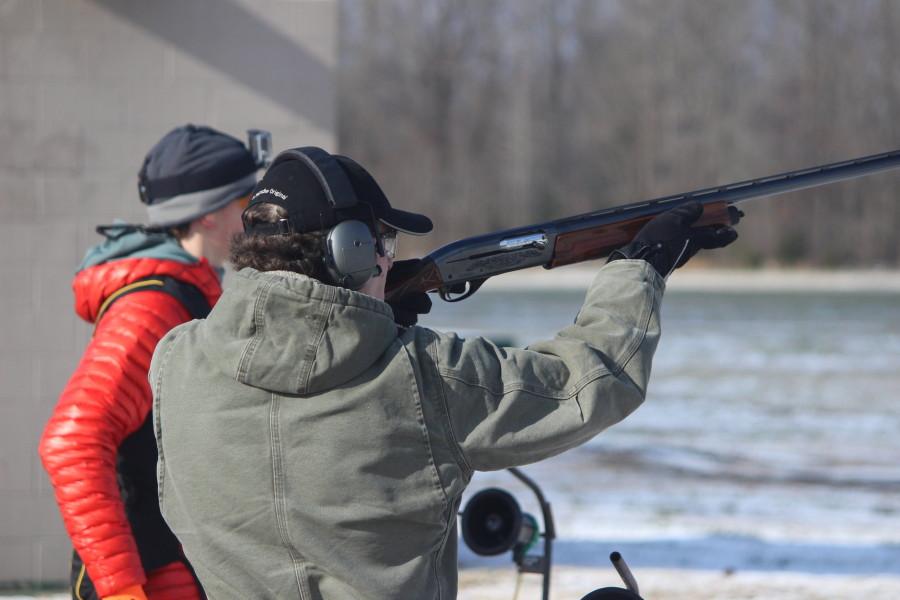Shots fired
Gun control debate is less polarizing than you think
“People ask you ‘what do you have to have to drive a car?’ ‘A driver’s license,’ you know,” senior Will Courtney, an avid hunter since the age of nine, said. “A car is just as dangerous as a gun. It just matters who’s driving.”
Courtney’s moderate stance on gun regulations may surprise some, but his views reflect a broad consensus between Americans who own guns and those who do not, one that is often overlooked in heated political debates.
On Jan. 4, the Obama administration released a new executive order that requires background checks for all gun sales. The most controversial element within the order is the new requirement that every individual selling guns must be licensed and must conduct background checks.
“The Bureau of Alcohol, Tobacco, Firearms and Explosives (ATF) is making clear that it doesn’t matter where you conduct your business — from a store, at gun shows, or over the Internet: If you’re in the business of selling firearms, you must get a license and conduct background checks,” a release from the Office of the White House Press Secretary reads.
The executive order was released less than a month after the fatal shooting at the Inland Regional Center in San Bernardino, Calif., where 14 individuals were killed. Though the San Bernardino shooting was the most recent mass shooting before the order’s release, it was not the only shooting cited in President Obama’s speech about the executive order.
These mass attacks, which have ranged from domestic terrorists acts to school shootings, include the shootings at Fort Hood Army base in 2009, the Aurora, Colo. Theater and Sandy Hook Elementary Shootings in 2012, and the Charleston, S.C. church shooting in 2015.
The order has received both cries of outrage and cheers of support from individuals all across the nation, especially of those both currently running or holding public office.
Shortly after the executive order was released, GOP frontrunner Donald Trump delivered a speech vowing to “unsign it so fast” if he is elected. Though Trump is strongly against the order, polls suggest that his view is not representative of the majority of the country.
The population of the United States currently stands at 318.9 million individuals. According to a New York Times’ national poll open during the second week of January in 2016, 88 percent of those individuals, around 280.63 million people, support the requirement of background checks for all gun sales.
Despite being a small portion of the United States’ population, students and faculty at St. George’s closely mimic the overall trend represented in the larger country. For the purposes of this article, a survey was sent out to the entire upper school, and of the 121 people who participated, 80.8 percent of people said they believed in the requirement of background checks to purchase guns.
Senior Harris Kearney is one of those people who supports the background check requirement.
“There needs to be more background checks when purchasing a weapon because it is too easy to purchase a weapon at guns shows and stuff like that,” Kearney said.
Though the NRA has been against any form of restriction on gun sales publicly, especially restrictions in the form of background checks, a new poll released on the Milwaukee Journal Sentinel shows that 74 percent of the NRA’s approximate 4 million members support the requirement of background checks for all gun sales.
Mrs. Leah Allison, Director of Library Services and head trap coach, has been a member of the NRA for several years and supports the background check requirement.
“I think the United States government should say, if you’re crazier than a betsy bug, you don’t need to buy a gun,” Mrs. Allison said.
Junior Elle Vaughn also believes we need to act to prevent more mass shootings.
“If there were any way possible to reduce the amount of deaths and injuries per year as a result of mass shootings, why should we not seize that opportunity?” Vaughn said.
Though a majority of students and faculty are in support of further gun laws, there are still those who oppose background checks, either doubting their effectiveness or viewing it as a violation of our Constitutional rights.
Junior Austin Skinner cited privacy concerns as the reason he is not in favor of universal background checks.
“It is our right to be able to bear arms,” Skinner said. “We should not have to have all of our secrets revealed to buy a gun.”
Junior Beck Sims agreed, pointing out that background checks may not prove effective.
“A criminal can get his hands on a gun wherever he goes. He can go to the black market, get someone to buy it for him if he’s a felon or anything, or he can steal it,” Sims said.
Despite individual differences of opinion, polling shows that a common ground exists, both nationally and locally. Mr. Mike Smothers, middle and high school science teacher and war veteran, believes that a solution exists to this problem, though the extreme ones suggested may not be the best option.
“When you start getting into shouting matches and name calling and all or nothing type of questions, it limits us to looking at where the possibilities are in the middle,” Mr. Smothers said. “Both sides could probably serve to turn it down, striking a good balance between what can we do to protect both interests because they are both very important.”











